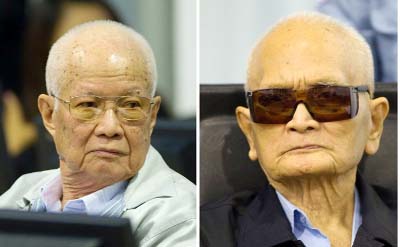
Agency :
Hearings began on Friday into the most far-reaching charges, including genocide, against two former leaders of Cambodia’s Khmer Rouge in what is likely to be the last chance to seek justice for 1.7 million deaths during their disastrous 1970s rule.
The defendants, Nuon Chea, 88, and Khieu Samphan, 83, the most senior surviving leaders of the group, were sentenced to life in prison in August for masterminding mass evacuations of Cambodians from their homes. They have appealed those convictions.
The trial that began Friday, expected to last until 2017, covers a broader range of crimes against humanity, as well as genocide and war crimes. It will address accusations that the Khmer Rouge ran work camps that enlisted Cambodians as slave laborers to build dams and airports and ran execution sites where those who fell afoul of the government’s policies were slaughtered, and will consider charges of genocide committed against Muslims and ethnic Vietnamese minorities.
“Of all the crimes in Democratic Kampuchea, there were none graver than the relentless and systematic effort of the senior Khmer Rouge leaders to identify and smash those they feared could one day oppose them,” said Chea Leang, one of the prosecutors. Democratic Kampuchea was the name of the state headed by the Khmer Rouge during their rule from 1975 to 1979.
The first witnesses will appear later this month to testify about work sites in Tram Kak, the “ideological center” of the Khmer Rouge movement, where collectivized labor and communal living, the hallmarks of the rule, were enforced with extreme brutality.
Nuon Chea is often described as the Khmer Rouge movement’s chief ideologue and was second-in-command to Pol Pot, the leader of the movement who died in the jungles of northwestern Cambodia in 1998. Khieu Samphan, a former teacher and Parliament member, joined the revolutionary Communist movement out of frustration with the corruption and decadence of 1960s-era Cambodia and became the Khmer Rouge’s head of state in 1976.
The tribunal, a joint effort of the Cambodian government and the United Nations, had split the case against the men into two trials to expedite a verdict.

